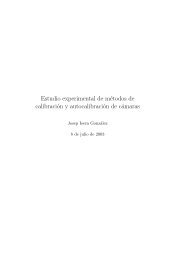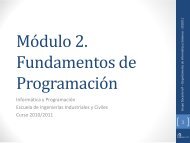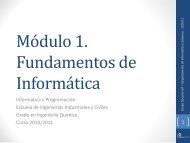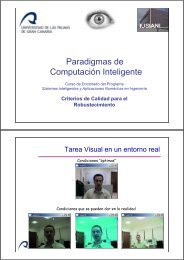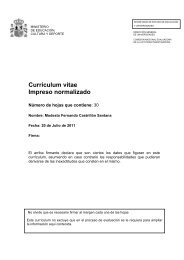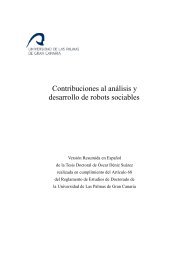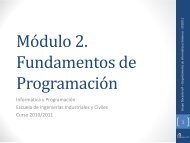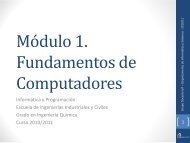PhD Document - Universidad de Las Palmas de Gran Canaria
PhD Document - Universidad de Las Palmas de Gran Canaria
PhD Document - Universidad de Las Palmas de Gran Canaria
You also want an ePaper? Increase the reach of your titles
YUMPU automatically turns print PDFs into web optimized ePapers that Google loves.
Conscious Unconscious<br />
CHAPTER 2. THE CASE OF SOCIAL ROBOTICS<br />
Explicit cognition Implicit cognition<br />
Immediate memory Long-term memory<br />
Novel, informative, and significant events Routine, predictable, uninformative events<br />
Atten<strong>de</strong>d information Unatten<strong>de</strong>d information<br />
Focal contents Fringe contents (e.g. familiarity)<br />
Declarative memory (facts) Procedural memory (skills)<br />
Supraliminal stimulation Subliminal stimulation<br />
Effortful tasks Spontaneous/automatic tasks<br />
Remembering (recall) Knowing (recognition)<br />
Available memories Unavailable memories<br />
Strategic control Automatic control<br />
Grammatical strings Implicit un<strong>de</strong>rlying grammars<br />
Rehearsed items in Working Memory Unrehearsed items<br />
Explicit inferences Automatic inferences<br />
Episodic memory (autobiographical) Semantic memory (conceptual knowledge)<br />
Normal vision Blindsight (cortical blindness)<br />
Table 2.2: Some wi<strong>de</strong>ly used euphemisms for conscious and unconscious phenomena (taken<br />
from [B.J. Baars, 2004]).<br />
atedness Hypothesis even proposes that generic intelligence evolves only after social in-<br />
telligence has <strong>de</strong>veloped). In fact, unconscious processes are behind all or part of what<br />
we call social abilities, like face and language recognition (as opposed to other mental<br />
processes like for example solving a differential equation, which require conscious effort)<br />
[Bargh and Williams, 2006]. From [Wheatley and Wegner, 2001]:<br />
"Much of our behavior in social life is unconsciously automatic. There is evi-<br />
<strong>de</strong>nce that people can respond automatically and unthinkingly to facial expres-<br />
sions, body gestures, hints about a person’s sex, ethnicity, or sexual orientation,<br />
information about someone’s hostility or cooperativeness, and a variety of other<br />
social stimuli. People also have unconscious automatic responses to things they<br />
like and dislike, from foods or books to i<strong>de</strong>as and social groups. ... Many of<br />
the automatic behaviors we do every day are things of which we are perfectly<br />
aware at the outset. We know we are getting in the car and heading off to work,<br />
for instance, or we know we are beginning to take a shower. Yet because we<br />
have done the act so often driving to work every day, showering every darn year,<br />
whether we need it or not we no longer need to think about the act after we have<br />
consciously launched it. These behaviors are often acquired skills, actions that<br />
become automatic only after significant repetition.<br />
18



